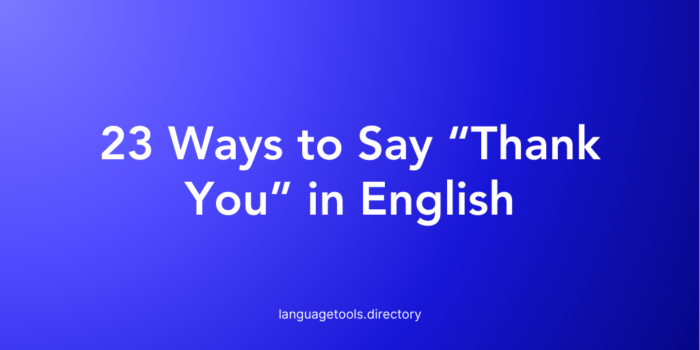Gratitude is a universal sentiment, but the way we express it can vary greatly depending on the situation, relationship, and culture. In English, the phrase “thank you” is foundational, but why stop there? Whether you want to show heartfelt appreciation, keep it casual, or add a creative flair to your message, the English language offers plenty of options. In this post, we’ll explore 23 unique ways to say “thank you” in English, providing context for when and how to use them.
Why Say More Than Just “Thank You”?
The phrase “thank you” traces its roots to the Germanic word for thought and gratitude, symbolizing not just politeness but genuine acknowledgment. While a simple “thank you” works in most situations, expanding your repertoire can make your gratitude feel more sincere, personal, and memorable.
Let’s dive into the various expressions, categorized by formality and context.
Formal Ways to Say “Thank You”
When you’re in a professional setting or want to convey deep gratitude, formal phrases can help you express appreciation with a touch of sophistication.
- I’m truly grateful.
- Perfect for expressing heartfelt thanks in professional or personal situations.
- I appreciate your kindness.
- Use this to acknowledge thoughtful gestures or support.
- I’m indebted to you.
- Ideal for situations where someone has gone above and beyond to help you.
- Many thanks.
- A classic, professional way to convey gratitude in emails or letters.
- I can’t thank you enough.
- For moments when words don’t seem sufficient to express your feelings.
- Thank you kindly.
- A polite and slightly old-fashioned way to say thanks, often heard in formal or courteous exchanges.
- I’m forever thankful.
- Best used for lasting gratitude, such as when someone supports you through a life-changing moment.
- I deeply appreciate it.
- A phrase that emphasizes the depth of your gratitude.
- I’m eternally grateful.
- Similar to “I’m forever thankful,” but even more dramatic, suitable for significant acts of kindness.
- This means the world to me.
- Use this when someone has done something profoundly meaningful.
Informal Ways to Say “Thank You”
For casual settings or among friends, you can keep things light while still expressing genuine appreciation.
- Thanks a ton!
- A playful way to emphasize gratitude.
- You’re a star!
- Perfect for acknowledging someone’s quick help or a small favor.
- You rock!
- A fun, energetic way to say thanks, often used with peers.
- Cheers!
- Commonly used in the UK and Australia, this casual phrase is great for informal settings.
- Appreciate it!
- A succinct, modern way to thank someone for small gestures.
- Big thanks!
- A cheerful option for informal messages or texts.
- Ta!
- A British slang term for “thank you,” often paired with “ta muchly” for extra charm.
- You’re a lifesaver!
- Ideal when someone helps you out of a tricky situation.
- Thanks a million!
- Adds an exaggerated but fun twist to your gratitude.
- You’re the best!
- Great for expressing appreciation to close friends or family.
Creative and Situational Ways to Say “Thank You”
Want to stand out? These phrases add creativity or adapt to specific situations.
- Much obliged.
- A formal yet charmingly old-fashioned way to say thanks, often used in British or Southern American English.
- Endless gratitude to you.
- This phrase conveys a deep, ongoing sense of thankfulness with a poetic touch, making it stand out while still being heartfelt and sincere. It works well when you want to acknowledge someone’s multifaceted help or support.
- Endless thanks.
- A poetic way to show ongoing gratitude.
How to Say Thank You in Writing
In modern communication, written expressions of gratitude—whether in emails, texts, or notes—can leave a lasting impression.
- Short Text Messages:
- “Thx a lot! 😊”
- “Can’t thank you enough 🙏.”
- “Appreciate it! ❤️”
- Professional Emails:
- “I truly appreciate your assistance with [specific task].”
- “Many thanks for your quick response!”
- Handwritten Notes:
- “Your kindness means so much to me. Thank you for [specific reason].”
How to Respond to “Thank You”
Gratitude often goes both ways. Here are a few thoughtful ways to reply when someone thanks you:
- Formal Responses:
- “You’re welcome.”
- “You’re most welcome.”
- “It was my pleasure.”
- “Happy to help.”
- Informal Responses:
- “No problem!”
- “Don’t mention it.”
- “Anytime!”
Conclusion
“Thank you” may be a small phrase, but its impact is profound. By exploring diverse ways to express your gratitude, you can make your appreciation more meaningful and suited to the occasion. Whether you’re in a formal setting, chatting with friends, or writing a thank-you note, these 23 expressions ensure you’ll never run out of ways to say “thanks.”
Wanna learn English? Discover the best tools to learn English in our directory!
